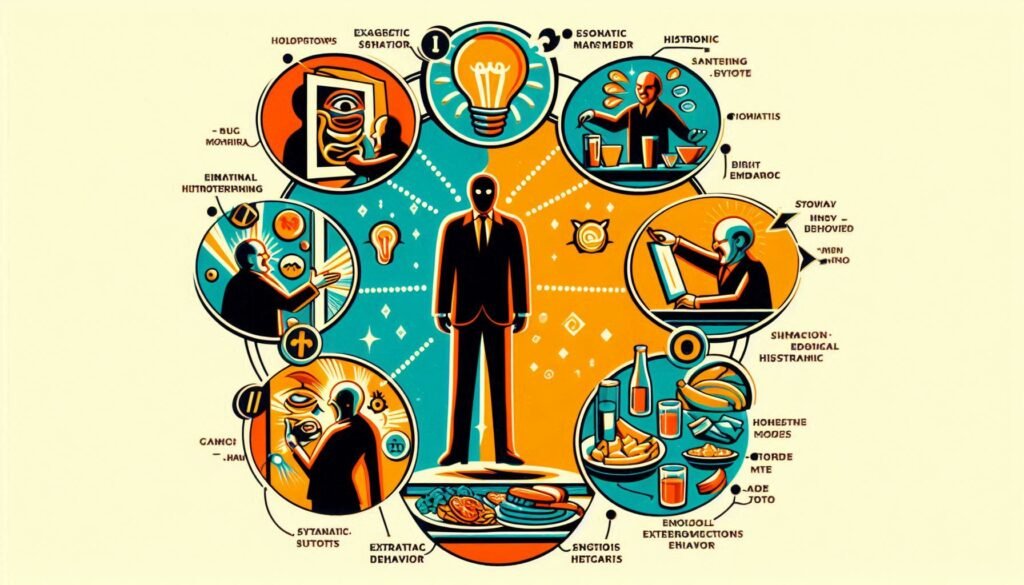Marriage can be one of life’s most rewarding experiences, but when a partner has Narcissistic Personality Disorder (NPD), it often feels like navigating a minefield. Understanding NPD in the context of marriage is crucial for both partners. It sheds light on behaviors that may seem baffling and helps find ways to cope with challenges.
For those married to someone with this disorder, daily life can present unique hurdles. The emotional rollercoaster can leave the non-narcissistic spouse feeling isolated and frustrated. But there are strategies available to foster healthier dynamics within the relationship.
In this post, we’ll explore what it’s like to be married to someone with NPD and offer practical solutions for making your marriage work despite these challenges. Whether you seek effective communication techniques or insights into preserving your identity, we’ve got you covered as we delve deep into this complex topic.

Understanding Narcissistic Personality Disorder (NPD) in Marriage
Narcissistic Personality Disorder (NPD) manifests in various ways, particularly within the realm of intimate relationships. Individuals with NPD often exhibit an inflated sense of self-importance and a constant need for admiration. This behavior can create significant challenges in a marriage.
In this dynamic, emotional intimacy may be limited. The narcissistic partner often struggles to empathize with their spouse’s feelings or needs. As a result, communication can become one-sided and superficial.
Moreover, spouses may find themselves walking on eggshells to avoid triggering outbursts of anger or criticism. It becomes difficult for them to voice concerns without fear of backlash.
Understanding these patterns helps non-narcissistic partners identify unhealthy dynamics early on. Recognizing NPD is the first step toward navigating its complexities while maintaining emotional well-being within the marriage.
The Challenges of Being Married to Someone with NPD
Being married to someone with Narcissistic Personality Disorder presents unique challenges that can strain the relationship. One significant hurdle is the constant need for validation from the narcissistic partner. This often leaves their spouse feeling overlooked and undervalued.
Communication tends to be one-sided, as narcissists may dismiss or belittle their partner’s feelings. This imbalance creates an environment where honest dialogue becomes increasingly difficult, leading to frustration and resentment.
Emotional manipulation is another common tactic employed by those with NPD. Gaslighting can leave partners questioning their reality and self-worth, making it hard to maintain a sense of personal identity.
Additionally, there’s often a lack of empathy from the narcissistic spouse. Understanding emotions or needs in moments of crisis becomes nearly impossible, which can exacerbate feelings of isolation for the non-narcissistic partner.
Recognizing Narcissistic Patterns in Marriage
Recognizing narcissistic patterns in marriage can be challenging. Often, these behaviors are subtle and evolve over time. A common sign is an excessive need for admiration. Your partner may constantly seek validation while dismissing your achievements.
Another pattern to watch for is a lack of empathy. This manifests as an inability to understand or share your feelings. You might find that discussions about your emotions lead nowhere.
Gaslighting is also prevalent in such relationships. If you often feel confused about reality or question your own judgment after conversations, this may be a warning sign.
Additionally, consider how conflicts are handled. Narcissistic individuals typically deflect blame and refuse to take responsibility for their actions, leaving you feeling powerless and unheard.
Being aware of these patterns can help navigate the complexities of a marriage impacted by narcissism. Understanding them paves the way toward healthier interactions and self-preservation strategies.
The Impact of NPD on the Non-Narcissistic Spouse
Being married to someone with Narcissistic Personality Disorder (NPD) can profoundly affect the non-narcissistic spouse. These individuals often experience feelings of isolation and confusion due to their partner’s self-centered behavior. Emotional neglect becomes common, leaving the non-narcissistic spouse feeling unvalued.
The constant need for validation from the narcissistic partner can lead to diminished self-esteem. Over time, this dynamic may strip away personal identity and confidence. Many spouses find themselves walking on eggshells, trying to avoid conflict while suppressing their own needs.
Additionally, gaslighting is a frequent tactic employed by those with NPD. This manipulation erodes trust in one’s perceptions and feelings, causing immense distress over time. The emotional toll can manifest as anxiety or depression, making it crucial for partners of narcissists to seek support and prioritize their mental well-being amidst these challenges.
Effective Communication Strategies
Effective communication is crucial in a marriage where one partner has Narcissistic Personality Disorder. It requires patience and understanding.
Use clear, direct language. Avoid vague statements that may lead to misunderstandings. When expressing feelings or concerns, focus on “I” statements rather than accusations. For example, say “I feel hurt when…” instead of “You always…”
Active listening plays a key role as well. Show your spouse you’re engaged by nodding and making eye contact while they speak. This can create an atmosphere of respect.
Timing matters too. Choose moments for important discussions when both partners are calm and receptive—not during conflicts or stressful situations.
Setting boundaries is essential for healthy communication. Clearly define what behaviors are acceptable, ensuring both partners understand these limits will help maintain respect in conversations.
Practice empathy even amid challenges. Recognizing the emotional state of your partner can foster more productive dialogue over time.
Managing Conflict in a Marriage with NPD
Managing conflict in a marriage where one partner has Narcissistic Personality Disorder (NPD) requires a strategic approach. It’s essential to recognize that traditional conflict resolution techniques may not work effectively.
First, stay calm and composed during disagreements. Your emotional stability can help de-escalate tensions. Avoid engaging in power struggles; instead, choose your battles wisely. Focus on the issues that truly matter.
Use “I” statements when expressing feelings or concerns. This technique helps reduce defensiveness and promotes understanding. For example, say “I feel overlooked” rather than “You never listen.”
Set clear boundaries for acceptable behavior during conflicts. Communicate these boundaries calmly but firmly to establish respect in discussions.
Seek professional support if needed. A therapist familiar with NPD can provide valuable strategies tailored to your situation and guide you through challenging interactions effectively.
Preserving Self-Identity in a Narcissistic Relationship
Maintaining your self-identity in a relationship with a narcissist can be incredibly challenging. Narcissistic partners often seek to dominate conversations and decisions, leaving you feeling invisible.
To preserve your sense of self, it’s crucial to prioritize personal interests and hobbies. Engage in activities that bring you joy. Whether it’s painting, hiking, or reading, make time for what makes you feel alive.
Setting boundaries is equally important. Clearly communicate your needs and limits without fear of backlash. This helps reinforce your individuality within the relationship.
Consider finding support outside the marriage. Friends and family can provide perspective and encouragement when you feel overwhelmed by narcissistic behavior.
Journaling can also help clarify thoughts and feelings about yourself separate from your partner’s influence. It serves as a powerful reminder of who you are beyond the dynamics of the relationship.
Nurturing connections with supportive individuals fosters resilience against emotional erosion caused by narcissism.
Parenting Challenges in a Marriage with NPD
Parenting in a marriage marked by Narcissistic Personality Disorder (NPD) presents unique challenges. The narcissistic partner often prioritizes their needs over the family’s emotional well-being. This can create an unstable environment for children.
Children may experience confusion due to inconsistent parenting styles. One parent might be overly critical while the other compensates with indulgence, leading to mixed messages about behavior and expectations.
Co-parenting becomes complicated as communication can break down easily. The narcissistic spouse may reject input from others, making it hard to reach common ground on parenting decisions.
The emotional toll on children is significant. They might struggle with self-esteem issues or develop anxiety stemming from the unpredictability of their home life.
It’s essential for the non-narcissistic partner to seek support, whether through therapy or community resources. Creating a nurturing atmosphere requires intentional effort amid challenging dynamics.
When to Consider Separation or Divorce
Deciding whether to separate or divorce when dealing with a partner who has Narcissistic Personality Disorder (NPD) is deeply personal and often complex. It’s essential to recognize patterns of emotional manipulation, constant criticism, or gaslighting that may have become part of your daily life.
If you find yourself feeling consistently drained, anxious, or unworthy after interactions with your spouse, these are significant red flags. Your mental health should always be a priority.
Consider separation if you notice an inability to communicate effectively about important issues. If attempts at dialogue lead only to escalated conflict or stonewalling, it might be time to reevaluate the relationship.
Consulting with a therapist can provide clarity on your situation. They can help identify healthy boundaries and support you in making informed decisions for your future happiness and well-being.
Healing and Recovery After Narcissistic Abuse
Healing and recovery after experiencing narcissistic abuse is a crucial journey for anyone who has been married to someone with Narcissistic Personality Disorder. The emotional turmoil inflicted by such relationships can leave deep scars, but it’s important to remember that healing is possible.
The first step in this process involves acknowledging the pain and trauma you’ve endured. Allow yourself to feel those emotions without judgment. This recognition lays the groundwork for your healing journey.
Seeking support from professionals, like therapists or counselors specializing in narcissistic abuse, can be invaluable. They provide tools and strategies tailored to your unique situation. Support groups also offer an opportunity to connect with others who have faced similar challenges, fostering a sense of community and understanding.
Self-care plays a vital role in recovery as well. Prioritize activities that promote mental well-being—exercise regularly, engage in hobbies you enjoy, or practice mindfulness techniques such as meditation or yoga. These practices help rebuild your self-esteem and reinforce your sense of identity outside the relationship.
Educating yourself about Narcissistic Personality Disorder can empower you further on this path. Understanding the dynamics at play helps demystify past experiences and reduces feelings of isolation or confusion.
It’s essential to set boundaries moving forward—both with potential new partners and within existing relationships—including family members who may not understand what you’ve gone through. Establishing these limits protects your newfound strength while reinforcing healthy relationship patterns.
Allow time for healing; it doesn’t happen overnight. Be patient with yourself as you navigate through layers of grief, anger, and eventual acceptance. Each small step taken brings you closer to reclaiming your life post-narcissism.
Although challenging, recovering from marriage involving Narcissistic Personality Disorder opens doors toward personal growth and healthier relationships ahead.



